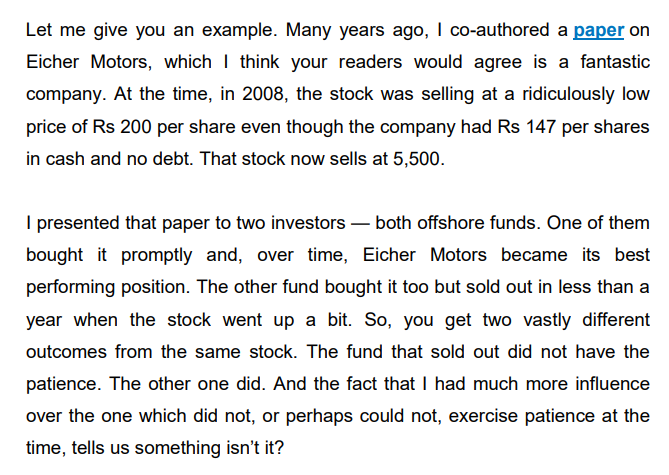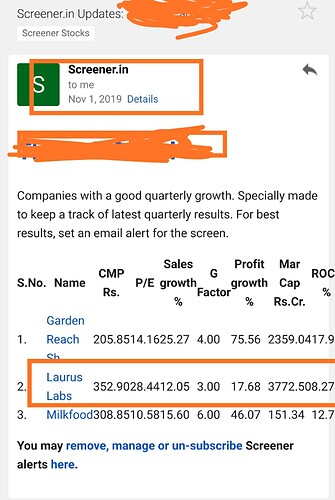My apologies in advance for a self-indulgent post. If you do choose to read it, perhaps it will serve as a checklist on a whole bunch of things that can go wrong.
I started working in 2003 and till 2007 had no money of note to invest. Whatever little I had, I traded in stocks like Reliance Natural Resources, BHEL etc. This was mostly based on recommendations by a broker. It was clueless tip based investing but given the market in 2007, I made a few profitable trades and some loss making ones but ended net positive. Dumb luck can work in roaring bull markets.
Then came 2008 and the crash with it. I exited in a panic with losses. I also sold my ESOPs. The stock would become one of the greatest companies in India. I never understood the competitive advantages of the local giant because I was enamored by all employers “phoren”.
I returned to the markets in 2010 well post the recovery, now with saved up bonuses. I was now fascinated by investing theory and buying stocks at “discount to fair price”. Given my job and access to fund managers, I managed to get inspired by the best of the best and bought stocks like Central Bank, Bank of Baroda, PNB, Venkys etc. If the best could buy these, who was I to not see “value”? PSU banks went on to do what PSU banks do best and the promoter of Venkys decided to buy a football club. The stock price halved overnight.
The amount I lost gives me shudders even now. My parents had by now realized that I had a propensity to commit self-destruction when it came to shares – and that I was too egoistic to buy mutual funds! They asked me to buy an apartment in my hometown and I went along with them. Committing to a house had the fortunate effect of blocking the remainder of my savings which I would have otherwise lost.
I met a truly great investor in 2011 in an “MNC” company. He would sometimes talk stock when he was drunk. I would not listen. Who listens to an angry, pissed off guy who dealt mostly in expletives when he was drinking? I will get back to him later.
2012 kicked in. I still had about a few lakhs left (yeah, I was earning okay back then). And I was determined not to give up. I was inspired by a senior and replicated a part of his portfolio of potential multi-baggers. The difference was that he had invested a fraction of his portfolio in them. And I had invested 100%. I was going to get rich in Pratibha Industries and Sanghvi Movers and Cera Sanitaryware. The promoter of Cera suffered a tragic loss and the share crashed (it was to recover phenomenally later) and I sold in a panic. And given the kind of businesses Sanghvi and Pratibha were, I was in at the wrong point of the cycle. Needless to say, my savings evaporated by 50% mostly because I panicked.
Zygo who is here on ValuePickr sat not far away from me and he was honing his skills. I should have known better and had a chat with him. I did not, instead choosing to curse my luck. At this time, I fell seriously ill and managed to lose my job as a consequence. Account balances were looking shameful.
2013 came and bought me a new job. At a salary lower than what I was earning in 2007. The job was unexpected because it came through a consultant who called me out of nowhere. Thank Lord Krishna for LinkedIn. And then, the angry man from 2011 called me out of nowhere as well. He had quit corporate life and he had heard what had happened to me. He was financially free and was working a job that he liked – managing money for an old client of his. He had just booked his 2nd apartment in Mumbai. This time he used his expletives to tell me to shut up and listen. And I did listen for a change. He told me he had never sold any stocks in his investing career except to buy his 1st apartment in Mumbai. And he still had a multi crore portfolio left over. I asked him how. He told me that he had held – PGHH, Gillette, Nestle, HDFC Bank, HDFC Ltd, Castrol, Bosch, Kotak Bank, and Marico for more than a decade. He told me about the wealth creating impact of blue-chip stocks that dominated the industries they operated in and the compounding that they did over time and how they could create the big money needed to flip the bird to the corporate world.
No miracles happened. I was not going to become a brilliant investor, bunkering for the long term. My build was that of a short term speculator. I had lost so much money and self-esteem due to the illness and the sudden job loss that I was not able to let go of my fears of finding myself with next to nothing in my bank account.
What I became instead was an opportunistic trader-investor hybrid buying mostly for a few weeks to a few months to a year at most. The difference was that I was now applying the concept of buying high ROCE, dominant businesses that were more likely to survive downturns. A shift “mostly” to quality, if you will.
Luck plays its part. Politics had changed and markets were celebrating. And I was also buying better stocks. 2014-2018 allowed me to recover not only what I had lost, but recover a few times over. I was cutting losses quick. I was letting winners run longer. I was still losing in a few picks but winning more often. The focus on quality had increased my odds of getting picks right. The profit taking was allowing me to sleep better.
Here is something people will rarely tell you when ranting about the story of their life – I slogged and I slogged at my day job. I made good bonuses over 5 years. And I saved every last rupee that I could. Traded and invested every last rupee of savings. I increased my base capital from trading gains, annual bonuses and savings. Base capital is critical. And it can come from the job you do. Don’t let anyone tell you about how they did it from stock picking alone!
In 2016, I had hit my first respectable milestone.
In this period, Zygo had also called once in a while. Conversations with him were motivating. He was already a fine stock-picker and doing very well for himself. He was generous enough to talk about his investing approach. I also kept speaking to my angry mentor every month. The point here is - talk to people who know more than you. Do your thing but talk to people who know better.
By 2019, my success had made me overconfident and addicted to trading. I made some money but now I was over trading. Every single day. Could not let go. I was buying like crazy – buying quality but now overpaying, and playing for a percent or two. I was 100% invested in January 2020.
2020 March and April – panic kicked in again. Funny thing is I had seen it coming. No not the virus - but the possible fallout. This was when the propaganda videos of people falling as if dead on the streets of Wuhan were just being released. I knew something was wrong. But I was going to trade. And despite cutting quickly, I was down 15% in a jiffy. And all the bounces I played were sold into again and again. Confidence evaporated. I stopped going crazy in September 2020. Took a month off from the itch. And got back in. Smaller positions and slower! Fortune favors the brave. I have now recovered 70% of what I lost in March-August 2020. In 2 months, I will be hitting another small personal milestone.
Look, I am not rich. But I am at a place where I don’t have to see the look of disappointment in my wife’s eyes anymore.
And I have no pretenses about my abilities. The market has humbled me many times. I have since 2013 focussed only on not making huge mistakes – the kinds that hurt you for years. I have outperformed a couple of very overrated fund/PMS managers.
Today, I hold thematic mutual funds in Pharma and IT and stocks in banking and FMCG sectors – the only two sectors I understand. I have also made some money in index funds and index ETFs. Investing is personal. You can mix and match as you please.
I must apologize again for taking too much of your time. I just wanted to say – do not give up hope. Ever. The mistakes will keep coming. You learn something new each time. We just have to keep trying to improve the odds in our favour.






